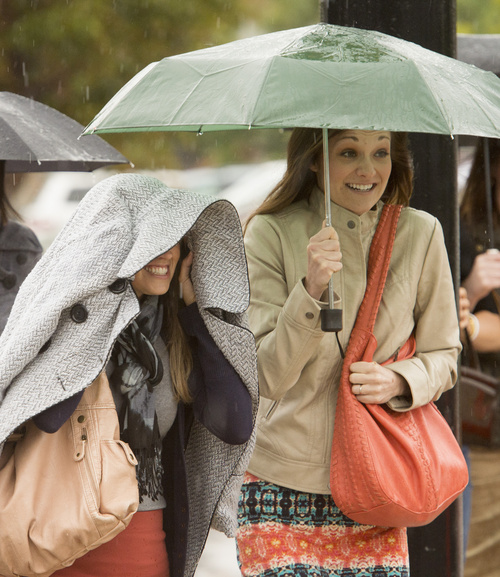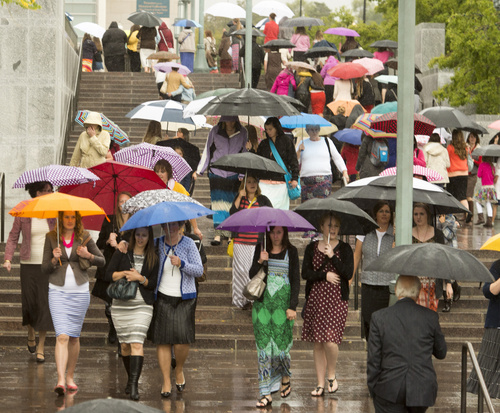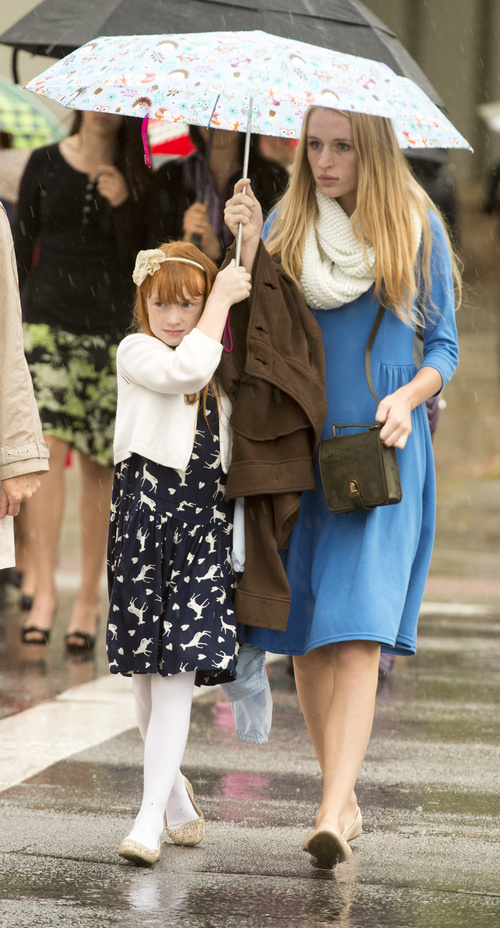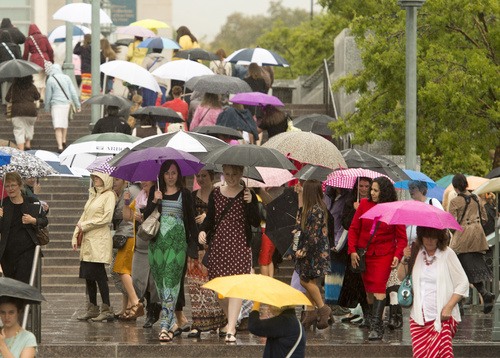This is an archived article that was published on sltrib.com in 2014, and information in the article may be outdated. It is provided only for personal research purposes and may not be reprinted.
Mormon feminists may have been surprised by some subtle changes in vocabulary and approach Saturday night at the general women's meeting for all LDS females age 8 and older.
Dieter F. Uchtdorf addressed the female audience — sitting in the giant Conference Center in downtown Salt Lake City or watching via satellite in LDS chapels across the globe — not just as "sisters" but also as "blessed disciples of Jesus Christ."
In a speech about living out one's faith joyfully, Uchtdorf, second counselor in the LDS Church's governing First Presidency, referred twice to women as "daughters of heavenly parents," alluding to the Mormon belief in male and female deities.
And, for the first time, the charismatic German leader described the meeting as the opening session of The Church of Jesus Christ of Latter-day Saints' 184th Semiannual General Conference. Until now, General Conference has referred only to the two-day gatherings held during the first weekends of April and October, with the women's meeting seen as a separate event.
Saturday night's meeting also featured the first-ever prayer at a session of General Conference by a black woman, offered by South African Dorah Mkhabela, a member of the LDS Young Women's General Board.
These changes come in the wake of wide-ranging conversations about the role of women in the LDS Church, including efforts by Ordain Women, a movement pushing to open the church's all-male priesthood to females. Women prayed for the first time at General Conference in April 2013, and female LDS leaders decided a year later to unite the women's auxiliaries into a single meeting to parallel the men's priesthood meeting.
Some feminists also have urged church leaders to talk more openly and often of a Heavenly Mother, who is considered equal to Heavenly Father.
At Saturday's night's meeting, three women auxiliary leaders talked about being prepared for temple rituals, making covenants and building faith in Jesus Christ, and included "wage earner" among women's roles.
Linda K. Burton, General Relief Society president for adult women, recounted the biblical parable of the 10 virgins, five of whom were "wise" because they kept their lamps filled with oil and five considered "foolish" because they did not.
Church attendance, monthly fasting, preaching, deeds of kindness, chastity and charitable giving, Burton said, build the "oil of spiritual preparation…drop by drop."
These kinds of acts prepare young Mormon women to participate in sacred rituals, especially in the temple, she said. "As we prepare our homes to be places where the Spirit is welcome, we will be prepared to feel more 'at home' when we enter the House of the Lord."
Jean A. Stevens, first counselor in the Primary General Presidency for children under age 12, described the importance of making and keeping promises to God.
"Covenants with God help us to know who we really are. They connect us to him in a personal way where we come to feel our value in his sight and our place in his kingdom. In a way we can't fully comprehend, we are known and loved individually by him. Think of it — each of us holds such a place in his heart. His desire is that we will choose the path that will bring us home to him," Stevens said. "That is our hope, our goal, and our joy."
Neill F. Marriott, second counselor in the Young Women General Presidency for girls between ages 12 and 17, discussed how Mormon women and girls can use their influence for good.
"We know the truth of the restored gospel," Marriott said. "We need to live it; we need to share it."
In a soft Southern accent, Marriott said, "We have our own roles on the earth —from daughter, mother, leader and teacher to sister, wage earner, wife, and more. Each is influential. Each role will have moral power...Our small acts of faith and service are how most of us can continue in God and eventually bring eternal light and glory to our family, our friends and our associates."
Thomas S. Monson, the 87-year-old "prophet, seer and revelator" of the 15 million-member LDS faith, attended the meeting, along with his first counselor, Henry B. Eyring. Neither spoke.
For the first time, the gathering at the Conference Center was closed to the news media. Reporters still could view the proceedings online and on television. The church also provided copies of the sermons.
Uchtdorf, who was the concluding speaker, laid out differences between rote behavior and joy-filled discipleship.
"We need to accept that the commandments of God aren't just a long list of good ideas," he said. "They are divine counsel, based on eternal truths, given to bring 'peace in this world, and eternal life in the world to come.' "
Mormons who see attendance at weekly meetings "as a personal way to increase their love of God, find peace, uplift others, seek the Spirit, and renew their commitment to follow Jesus Christ will find a far richer experience than those who simply put in their time sitting in a pew," Uchtdorf said.
"When we treat God's commandments and our part in building his kingdom like something to check off on a to-do list, we miss the heart of discipleship."
He ended by assuring the female crowd that God knew them and loved them as individuals "not only for who you are this very day, but also for the person of glory and light you have the potential and the desire to become."









